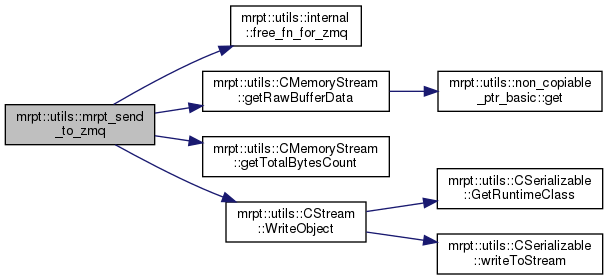Detailed Description
or above) (in #include <mrpt/utils/serialization_zmq.h>)

|
Namespaces | |
| mrpt::utils::internal | |
Functions | |
| template<typename ZMQ_SOCKET_TYPE > | |
| void | mrpt::utils::mrpt_send_to_zmq (ZMQ_SOCKET_TYPE zmq_socket, const mrpt::utils::CSerializable &obj, const size_t max_packet_len=0) |
| Send an MRPT object to a ZMQ socket. More... | |
| template<typename ZMQ_SOCKET_TYPE , typename VECTOR_MSG_T > | |
| bool | mrpt::utils::mrpt_recv_from_zmq_buf (ZMQ_SOCKET_TYPE zmq_socket, VECTOR_MSG_T &out_lst_msgs, mrpt::utils::CMemoryStream &target_buf, bool dont_wait, size_t *rx_obj_length_in_bytes) |
| Users may normally call mrpt_recv_from_zmq() and mrpt_recv_from_zmq_into(). More... | |
| template<typename ZMQ_SOCKET_TYPE > | |
| mrpt::utils::CSerializable::Ptr | mrpt::utils::mrpt_recv_from_zmq (ZMQ_SOCKET_TYPE zmq_socket, bool dont_wait=false, size_t *rx_obj_length_in_bytes=nullptr) |
| Receives an MRPT object from a ZMQ socket, determining the type of the object on-the-fly. More... | |
| template<typename ZMQ_SOCKET_TYPE > | |
| bool | mrpt::utils::mrpt_recv_from_zmq_into (ZMQ_SOCKET_TYPE zmq_socket, mrpt::utils::CSerializable &target_object, bool dont_wait=false, size_t *rx_obj_length_in_bytes=nullptr) |
| Like mrpt_recv_from_zmq() but without dynamically allocating the received object, more efficient to use if the type of the received object is known in advance. More... | |
Function Documentation
◆ mrpt_recv_from_zmq()
| mrpt::utils::CSerializable::Ptr mrpt::utils::mrpt_recv_from_zmq | ( | ZMQ_SOCKET_TYPE | zmq_socket, |
| bool | dont_wait = false, |
||
| size_t * | rx_obj_length_in_bytes = nullptr |
||
| ) |
Receives an MRPT object from a ZMQ socket, determining the type of the object on-the-fly.
- Parameters
-
[in] zmq_socket The zmq socket object. [in] dont_wait If true, will fail if there is no data ready to be read. If false (default) this function will block until data arrives. [out] rx_obj_length_in_bytes If non-nullptr, the object length will be stored here.
- Returns
- An empty smart pointer if there was any error. The received object if all went OK.
- Note
- Including
<mrpt/utils/serialization_zmq.h>requires libzmq to be available in your system and linked to your user code. This function can be used even if MRPT was built without ZMQ support, thanks to the use of templates.
- Exceptions
-
std::exception If the object finds any critical error during de-serialization.
- See also
- mrpt_recv_from_zmq_into
- Note
- See examples of usage in https://github.com/MRPT/mrpt/tree/master/doc/mrpt-zeromq-example
Definition at line 175 of file serialization_zmq.h.
References mrpt::utils::internal::free_zmq_msg_lst(), mrpt::utils::mrpt_recv_from_zmq_buf(), and mrpt::utils::CStream::ReadObject().

◆ mrpt_recv_from_zmq_buf()
| bool mrpt::utils::mrpt_recv_from_zmq_buf | ( | ZMQ_SOCKET_TYPE | zmq_socket, |
| VECTOR_MSG_T & | out_lst_msgs, | ||
| mrpt::utils::CMemoryStream & | target_buf, | ||
| bool | dont_wait, | ||
| size_t * | rx_obj_length_in_bytes | ||
| ) |
Users may normally call mrpt_recv_from_zmq() and mrpt_recv_from_zmq_into().
This function just stores the received data into a memory buffer without parsing it into an MRPT object.
- Returns
- false on any error
Definition at line 97 of file serialization_zmq.h.
References mrpt::utils::CMemoryStream::assignMemoryNotOwn(), mrpt::utils::CMemoryStream::Clear(), mrpt::utils::CMemoryStream::getTotalBytesCount(), mrpt::utils::CMemoryStream::Seek(), and mrpt::utils::CStream::WriteBuffer().
Referenced by mrpt::utils::mrpt_recv_from_zmq(), and mrpt::utils::mrpt_recv_from_zmq_into().


◆ mrpt_recv_from_zmq_into()
| bool mrpt::utils::mrpt_recv_from_zmq_into | ( | ZMQ_SOCKET_TYPE | zmq_socket, |
| mrpt::utils::CSerializable & | target_object, | ||
| bool | dont_wait = false, |
||
| size_t * | rx_obj_length_in_bytes = nullptr |
||
| ) |
Like mrpt_recv_from_zmq() but without dynamically allocating the received object, more efficient to use if the type of the received object is known in advance.
- Parameters
-
[in] target_object The received object will be stored here. An exception will be raised upon type mismatch.
- Returns
- true if all was OK, false on any ZMQ error.
- See also
- mrpt_recv_from_zmq() for details on the rest of parameters.
- Note
- See examples of usage in https://github.com/MRPT/mrpt/tree/master/doc/mrpt-zeromq-example
Definition at line 203 of file serialization_zmq.h.
References mrpt::utils::internal::free_zmq_msg_lst(), mrpt::utils::mrpt_recv_from_zmq_buf(), and mrpt::utils::CStream::ReadObject().

◆ mrpt_send_to_zmq()
| void mrpt::utils::mrpt_send_to_zmq | ( | ZMQ_SOCKET_TYPE | zmq_socket, |
| const mrpt::utils::CSerializable & | obj, | ||
| const size_t | max_packet_len = 0 |
||
| ) |
Send an MRPT object to a ZMQ socket.
- Parameters
-
[in] obj The object to be serialized and sent to the socket. [in] zmq_socket The zmq socket object. [in] max_packet_len The object will be split into a series of ZMQ "message parts" of this maximum length (in bytes). Default=0, which means do not split in parts.
- Note
- Including
<mrpt/utils/serialization_zmq.h>requires libzmq to be available in your system and linked to your user code. This function can be used even if MRPT was built without ZMQ support, thanks to the use of templates.
- Exceptions
-
std::exception If the object finds any critical error during serialization or on ZMQ errors.
- Note
- See examples of usage in https://github.com/MRPT/mrpt/tree/master/doc/mrpt-zeromq-example
Definition at line 41 of file serialization_zmq.h.
References mrpt::utils::internal::TFreeFnDataForZMQ::buf, mrpt::utils::internal::TFreeFnDataForZMQ::do_free, mrpt::utils::internal::free_fn_for_zmq(), mrpt::utils::CMemoryStream::getRawBufferData(), mrpt::utils::CMemoryStream::getTotalBytesCount(), and mrpt::utils::CStream::WriteObject().
